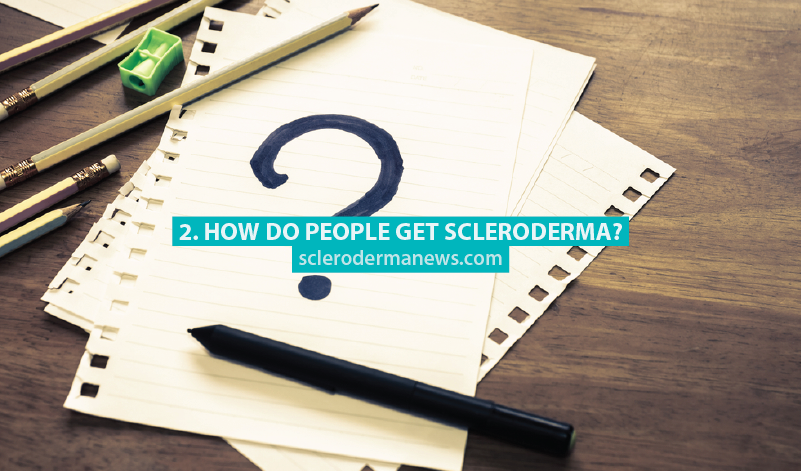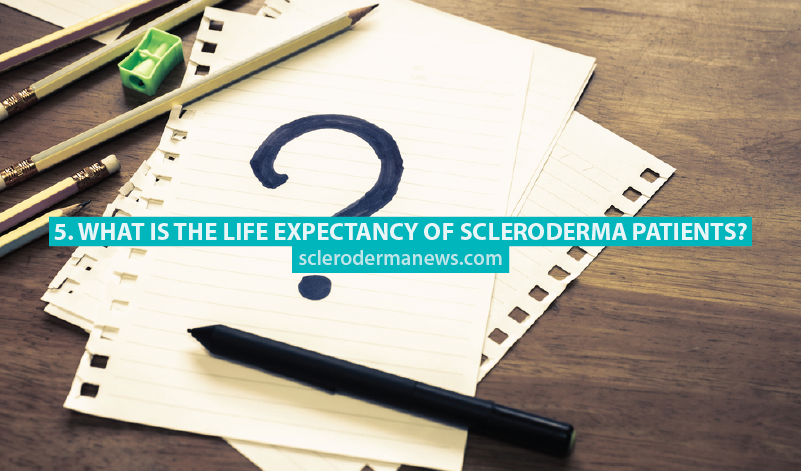10 Scleroderma FAQs

If you have been newly diagnosed with scleroderma or have a loved one or friend who has the disease, there may be many questions going through your mind. We’ve come up with a list of some of the most frequently asked questions about scleroderma according to the Scleroderma Research Foundation.
1. What does scleroderma mean?

The word ‘scleroderma’ comes from two Greek words – ‘sclero’ which means hard and ‘derma’ which means skin.
Find out how scleroderma affects the skin of our resident blogger, Nicola Whitehill.
2. How do people get scleroderma?

Currently, there is no known cause for scleroderma. Scientists are investigating many factors to find out why and how people get the disease.
Find out about 10 important scleroderma terms you should know.
3. Who is most likely to get scleroderma?

Scleroderma can affect anyone of any age, but it appears that women between the ages of 30 and 50 are more likely to have scleroderma than any other group.
Read and see the harsh reality of living with scleroderma.
4. Are there different types of scleroderma?

There are two main subtypes of scleroderma — systemic and localized.
Localized scleroderma tends to only affect skin and muscle and usually only in one or two areas of the body. This type of scleroderma can be split into two categories – morphea and linear.
Morphea scleroderma tends to manifest on the wrists and shows up as plaques (plax) that are smooth, thickened patches of skin which later turn hard.
The linear type of localized scleroderma usually shows up on the face, legs or arms. Bands of different colored skin,(red, purple or blue) appear. The bands are fairly long and the skin is thicker and firmer.
Systemic scleroderma means that any part of the body can be affected, including internal organs and the skin. Secondary diseases can occur because of the damage systemic scleroderma does to the body, particularly the lungs, hearts, GI tract and kidneys. Systemic scleroderma can be further split into two groups – limited and diffuse — both of which can be fatal. Diffuse scleroderma progresses at a much fast rate than limited.
Stem cell treatment benefits 94% of diffuse scleroderma patients. Read more about this here.
5. What is the life expectancy of scleroderma patients?

Because no two cases of scleroderma are the same, different people will likely struggle with different secondary diseases and at different severities. That said, the expectancy of any individual scleroderma patient depends on many factors.
Read how individualized intervention programs benefit scleroderma patients.
6. Can scleroderma be cured?

As yet there is no cure for scleroderma. However, there are treatments for the complications that arise from the condition.
Learn 10 important scleroderma terms you should know.
7. Can you catch scleroderma?

Scleroderma is not a contagious disease. No one can catch it, no patient can infect anyone.
Read some simple steps you can take to help maintain your general health if you have scleroderma.
8. Is it a hereditary disease?

While some researchers are currently studying the genetics behind scleroderma it is not considered a heritable disease. Scleroderma running in families is considered rare. If you have scleroderma you are unlikely to pass it on to your children.
Hear and see the reality of life with scleroderma.
9. Can you have children if you have scleroderma?

Because everyone’s experience with scleroderma is unique, different patients will have different complications which may or may not hinder childbirth.
Read how individualized intervention programs benefit scleroderma patients.
10. Where do I find a scleroderma specialist?

Your primary doctor will be able to refer you to doctors who specialize in scleroderma and any secondary diseases you may have in connection with scleroderma.
Learn 10 important scleroderma terms that you should know.
Scleroderma News is strictly a news and information website about the disease. It does not provide medical advice, diagnosis or treatment. This content is not intended to be a substitute for professional medical advice, diagnosis, or treatment. Always seek the advice of your physician or other qualified health provider with any questions you may have regarding a medical condition. Never disregard professional medical advice or delay in seeking it because of something you have read on this website.






